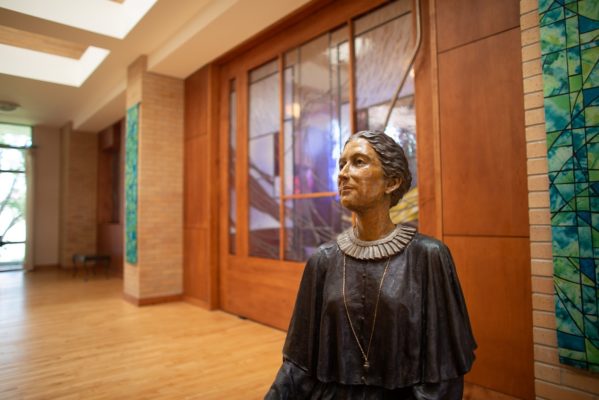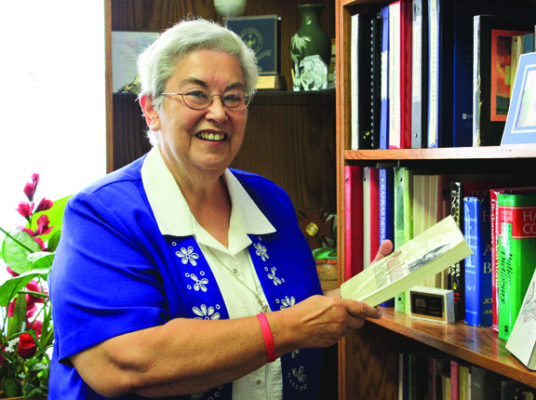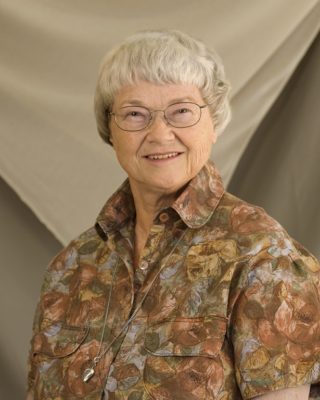The Adorers of the Blood of Christ (ASC), who founded Newman University, will celebrate 150 years of ministry in the U.S. in 2020.
The ASC was founded in Italy on March 4, 1834 by St. Maria De Mattias as an active teaching order, an apostolic order, which played a large part in its early ministries in the U.S.

After much active work, the congregation received papal approval in 1855 and St. Maria De Mattias took a public vow of chastity. Her spiritual director John Merlini, CPPS, then gave her a gold heart imprinted with three drops of blood, which inspired the similar silver heart that all ASC wear today.
In the next few years, many religious communities of women felt the need to leave Europe for America due to the political unrest in various countries.
Between 1870 and 1873, these sisters were welcomed with open arms in the U.S., and in response, opened hospitals, schools and a variety of other ministries to help other immigrants. They eventually established their home in Ruma, Illinois, where the Newman Troubadours have made annual trips to sing since 2010.
In 1893, the ASC came to Kansas to teach in parish schools, settling in Westphalia. They followed with missions in Herndon, Odin, St. Mark’s, Ost, Aleppo and Andale.
Due to the larger number of sisters teaching in Kansas, a central house was established in Wichita in 1902, which was opened by Mother Clementine Zerr and three additional sisters on what is now Newman University. They started with ministries in education and health care. By the inspiration of Vatican II and the needs of the community, they moved into additional ministries in religious education outside of the Catholic school system, social outreach and parish assistance.

Newman University Director of Mission Effectiveness Sister Charlotte Rohrbach, ASC, said she appreciates that the ASC have consistently worked to fulfill the needs of the community.
“For me, it’s very important that we follow the call to be able to serve individuals that were in need of help. There was a need here in the United States,” she said. “We were basically unable to do the type of service that we wanted to do in the Germanys and consequently when the invitation came, I’m glad they took it.”
The Adorers divided into three provinces in 1929 — Wichita, Kansas; Ruma, Illinois; and Columbia, Pennsylvania. In October 2000, the three U.S. provinces consolidated into one.
On Sept. 12, 1933, led by Beata Netemeyer, ASC, the Wichita province founded Sacred Heart Junior College.
During the 1950s, the institution became a four-year liberal arts college for young women and renamed Sacred Heart College. By 1958, men were admitted to the college but could enroll only in the evening courses and summer sessions. The name of the school was changed to Kansas Newman College in 1973 and finally Newman University in July of 1998.
Throughout the institution’s history, the ASC have been constant supporters and the ASC have served as teachers, presidents, faculty and administrators.
Sister Barbara Borders, ASC, teaches and tutors at the university. She said for her, it is the continued expansion of the ASC that fascinates her.

“To me, it’s amazing to look where we are all around the world. When we have sisters from Tanzania that come to stay, it’s amazing,” she said. “Now we just moved into Vietnam. That was an American-Vietnamese who went to start because some of the Vietnamese who wanted to join us had to go to South Korea, so now we are in Vietnam. We keep spreading.”
Internationally, the ASC have approximately 1,200 vowed members with more than 2,000 associates serving on all inhabited continents and in 26 nations.
The U.S. presently has just under 200 ASC members and approximately 350 associates. The U.S. Adorers continue to adapt their ministries to the greatest needs facing the areas where they minister.


